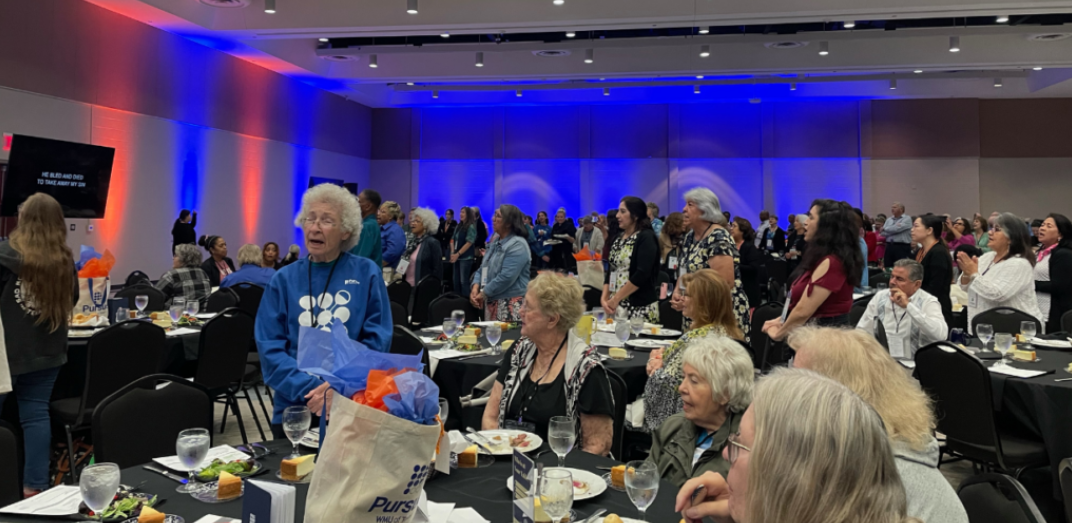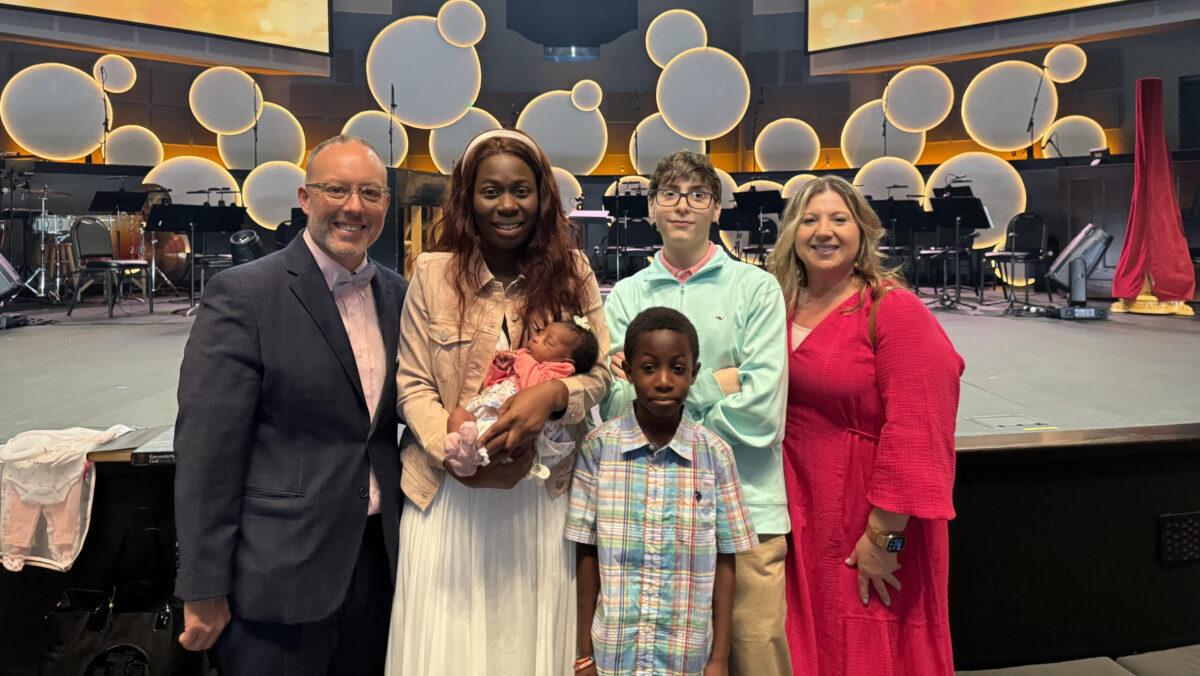By David L. Chancey
McDonough Road Baptist Church
A few weeks ago, Freddie Freeman hit his first home run as a Los Angeles Dodger in his first at bat against his former teammates. What a storyline!
 Right after the World Series, Atlanta Braves fans anxiously waited for the Braves and first baseman Freeman to agree on a new contract allowing him to finish his career as a Brave. It didn’t happen.
Right after the World Series, Atlanta Braves fans anxiously waited for the Braves and first baseman Freeman to agree on a new contract allowing him to finish his career as a Brave. It didn’t happen.
As the situation dragged out, I prepared myself for the probability the two sides would part ways. Eventually, they did in dramatic fashion.
In mid-March, the Braves traded for Matt Olsen to play first base. Subsequently Freeman, a free agent, signed with the Los Angeles Dodgers. Atlanta native Olsen returns to the city to play for his hometown team, while Freeman returns to his native southern California to play.
Sounds like a win-win for both men and both franchises, but many Braves fans felt disappointment. There was that initial letdown when the news reported we secured a new first baseman, making it obvious Freddie was not returning. We fans reminded ourselves, though we get emotionally attached to our favorites, baseball is ultimately a business. Business is business.
Former Baseball Commissioner Bart Giamatti, speaking of the emotion of the game, wrote, “It breaks your heart. It is designed to break your heart.”
Not only do our teams let us down and our hearts break, but sometimes life doesn’t work out the way we envisioned.
We briefly thought we’d get to keep an out-of-state grandson a few days this summer while his parents traveled. We worked out our schedules and started making plans, then logistics changed on the other end. What appeared to be developing isn’t going to happen.
Disappointment is part of living in a world that’s not always fair.
How do you define disappointment? Disappointment is the feeling we experience when our hopes are not fulfilled or our expectations are not met. Sometimes unrealistic expectations do not match actual circumstances. Thus we sense a moment of sadness.
How do we deal with disappointment?
How do we do it?
- Own it. It’s OK to say, “I’m really disappointed.” Recognize the sadness and take a moment to grieve.
- Name it. Part of owning it is recognizing exactly why you’re disappointed. Identify the gap between your expectation and reality and express, “I am disappointed because __________.”
- Share it with a trusted listener. Get it off your chest and talk it out.
- Refuse to dwell on it. Life moves on and so must we. It’s unhealthy to dwell in the “valley of unmet expectations.”
- Embrace the letdown as an opportunity to grow. I was a late bloomer on the bicycle front.
I didn’t learn to ride a bike until I was in fourth grade. I don’t remember why I took so long, maybe because I didn’t like falling on asphalt and getting scraped up.
Early one Saturday morning, I raised the garage door, mounted my bike and rode down the driveway. No helmet, no help, just me, my bike and possible disaster ahead. I kept my balance for a few minutes. But this particular morning, when I fell, I hopped back on my bike and rode again until my confidence grew.
Winston Churchill said, “Success is the ability to go from one failure to another with no loss of enthusiasm.” Disappointment can teach resilience.
- Replace disappointment with deeper trust. Isaiah 26:4 presents a powerful reminder to those dealing with disappointment: “Trust in the Lord forever, for the Lord God is an everlasting rock.” When life is uncertain, God is always certain. He is our rock. Trust God.
- Focus on the Peace Giver, not the peace disrupters. Isaiah 26:3 reads, “You will keep him in perfect peace, whose mind is stayed on You, because he trusts in You.” We too readily focus on the circumstances robbing our peace rather than the Person who brings peace and comfort.
- Thank God anyway. 1 Thessalonians 5:18 says, “In everything give thanks, for this is the will of God in Christ Jesus for you.” Thank God He is in control and works all things together for our good and His glory (Rom. 8:28).
God may have something far better for us than what didn’t work out.
EDITOR’S NOTE — David L. Chancey is pastor of McDonough Road Baptist Church in Fayetteville, Georgia. Visit davidchancey.com to read more of his articles.
Yay, nay and delay
By Franklin Kirksey
Spanish Fort, Ala.
Imagine after a dramatic conversion and call to become a missionary, some of the people you minister to misunderstand your mission, misjudge your motives and mischaracterize your ministry.
How do you deal with it? From Paul’s experience there are three things to do.
3 steps to take
First, exercise spiritual restraint. Paul explains, “For our boasting is this: the testimony of our conscience that we conducted ourselves in the world in simplicity and godly sincerity, not with fleshly wisdom but by the grace of God, and more abundantly toward you. …
“Now I trust you will understand, even to the end (as also you have understood us in part), that we are your boast as you also are ours, in the day of the Lord Jesus.” (2 Cor. 1:12–16).
Second, exhibit sweet reasonableness. Paul elaborates, “Therefore, when I was planning this, did I do it lightly? Or the things I plan, do I plan according to the flesh, that with me there should be Yes, Yes, and No, No? …
“For the Son of God, Jesus Christ … in Him was Yes. For all the promises of God in Him are Yes, and in Him Amen, to the glory of God through us. … Moreover I call God as witness against my soul, that to spare you I came no more to Corinth” (2 Cor. 1:17–23).
Third, extend sacred reconciliation. Paul says, “Not that we have dominion over your faith, but are fellow workers for your joy; for by faith you stand” (2 Cor. 1:24).
Here, Paul graciously extends the right hand of fellowship and forgiveness to restore the relationship between them for God’s glory.
“But the fruit of the spirit is love, joy, peace, patience, kindness, goodness, faithfulness, gentleness and self-Control.”
Galatians 5:22–23
In the Gospel of Luke, chapter 10, a person asked Jesus what was required to inherit eternal life. Jesus directed him to the written Law and asked what his reading of it was. After he answered “You shall love the LORD your God with all your heart, with all your soul, with all your strength and with all your mind and your neighbor as yourself,” Jesus confirmed his answer as correct and instructed him to “Do this and you will live.” Further questioning Jesus, the man asked “Who is my neighbor?” Jesus followed by telling what has come to be known as the Parable of the Good Samaritan.
Upon the conclusion of the parable, Jesus posed the question, “Which of these three do you think was the neighbor to the one who fell among thieves?”
The man responded, “He who showed mercy on him.” Jesus said to him “Go and do likewise.”
As we strive in our lives, ministries and churches to love God and love our neighbor, may we be quick to extend mercy as we work together in the mission of God’s Kingdom.
Jae McKee
State director of missions and church planting for the Alaska Baptist Resource Network
“I’m afraid some people are not rejecting Jesus as much as the way He’s presented. I believe part of the reason the church is declining is we are still using point driven, abstract [methods] to deliver biblical truths when the people have lost interest in abstract learning. But people love to listen to stories,” said Jack Day, former IMB missionary to Brazil.
“This ministry is not intended for church kids only,” said Bobby Carr, youth minister at Flemingsburg Baptist Church in Kentucky. “It’s mainly geared to reaching out to kids who are unchurched. It gives them a safe place, gets them off the streets and offers positive relationships with adults. … We have the gospel to share with them and there’s nothing better for them to hear.”
“It is exhausting … but God is using us and we don’t want to complain. … God is using Romanians for such a time as this. We are to be the hands and feet of Jesus, but we also have to use our mouths to share the gospel and make disciples,” said Sabin Boruga, Baptist church planter in Sighisoara, Romania.
“I like to say I’m a missionary to pickleball or a pickleball chaplain,” said Danny Lovett, pastor emeritus at Church at Chelsea Westover in Harpersville, Alabama. Lovett will compete in the National Senior Games in pickleball in Fort Lauderdale, Florida, in May.
From the Twitterverse
@pastor_adam
“The goal of Christian worship is not for you to leave “feeling good” because our feelings are deceptive and fleeting. Rather, worship is meant for us to marvel at the person, work, and character of God.”
@dailyspurgeon
Men who understand the gospel are not quite so common as we sometimes suppose.
@micahfries
Genuine faith can happen in hurt; it often can’t see ahead, and yet it makes a conscious decision to trust God even when our heart & emotions tell us otherwise. Real faith is often expressed through tears and even anxiety.
@macbrunson
We are desperately in need of revival in the SBC because
—we are desperately in need of revival in the local churches because
—we are desperately in need of revival in the pulpit because
—we are desperately in need of revival in my heart.
@brocraigc
I receive so much joy praying for many pastors, over 500 to be exact. I love when I get texted an answer to prayer. Tonight the text was, “It’s officially official.” We’ve been praying for this for a long time. This pastor got a much needed job to help provide for his family. Rejoice!
@desiringGod
“Seek the Lord, all you humble of the land, who do His just commands; seek righteousness; seek humility; perhaps you may be hidden on the day of the anger of the Lord.” —Zephaniah 2:3
@haines_matt
This is not the time to take a victory lap, it’s the time to take a basin and a towel.
@shane_pruitt78
Everyone is going to live forever somewhere. Knowing or not knowing Jesus determines where.
@dandarling
The most effective advocacy builds coalitions of allies rather than lists of enemies.








